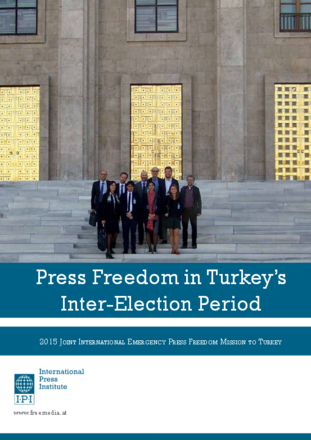
Over the last decades, Turkey has signed different agreements seeking to guarantee democracy and respect for human rights. Still, intimidation, harassment, attacks and unjustified legal and financial interventions against journalists and media centers occur frequently. As the situation deteriorated severely in the inter-election period between June and October 2015, eight international organisations undertook a Joint International Emergency Press Freedom Mission. Rappresentative of eight free expression and press freedom groups met with major media outlets and with three major turkish parliamentary parties.
This report highlights the deep concerns expressed after the Mission conducted in October. Intimidation and threatening measures including legal cases against journalists for criticism of the president, applying anti-terror or criminal defamation laws to silence journalists, or using financial and economic pressure against media companies occur frequently. Moreover, ongoing imprisonment of journalists and deportations of foreign journalists, provoke a rise of self-censorship. Journalists’ abilities to report freely and independently on matters of public interest shrink and the pressures are likely to hinder a free and fair election.
In the report, the mission’s representatives ask for a climate in which journalists are able to freely investigate stories involving matters of public interest, including allegations of corruption, the “Kurdish issue”, alleged human rights violations and armed conflict – particularly issues related to the ongoing conflict in Syria.
The participating organizations were: International Press Institute, Committee to Protect Journalists, Reporters Without Borders, Article 19, Index on Censorship, Ethical Journalism Network, International Federation of Journalists, European Federation of Journalists, Journalists Union of Turkey. Each chapter of the report is written by a different member of the mission delegation.
Tags: Impunity Defamation and Libel Media ownership TurkeyThe content of this article can be used according to the terms of Creative Commons: Attribution-NonCommercial 4.0 International (CC BY-NC 4.0) . To do so use the the wording "this article was originally published on the Resource Centre on Media Freedom in Europe" including a direct active link to the original article page.

